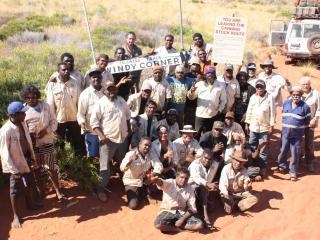
Martu are the traditional owners of the Western Desert region in Western Australia. This region comprises parts of the Great Sandy, Little Sandy and Gibson Deserts. The Western Desert Martu Ranger Program is supported by Kanyirninpa Jukurrpa (KJ). It is delivered through four ranger teams working across 6.5 million hectares of Indigenous land.
The program delivers a range of environmental outcomes including:
- weed and feral animal control
- fire and cultural heritage management
- conservation of threatened species such as the black-footed rock wallaby, greater bilby, mulgara and marsupial mole.
The rangers also work closely with schools and communities to spread the word about the program.
Jigalong Rangers
The Jigalong Rangers work with community members on natural and cultural resource management activities such as:
- water management
- mosaic burning of country
- weed management
- feral animal control.
The use of helicopters enables the rangers to access, map and manage country that is not easily accessible to Martu.
The rangers collaborate with the Western Australian Government to protect the black-footed rock wallaby, or warru as known by Martu. They also conduct predator control and monitoring activities such as trapping and microchipping of warru. The team is responsible for tourism management activities including:
- Canning Stock Route permit compliance checks
- the provision of visitor information.
Parnngurr Men's Ranger Team
The Parnngurr Men’s Ranger Team works with the rest of the community to look after country east of Parnngurr. They are employed to deliver water management, fire management and weed management activities.
This team is highly praised by the community for opening access to country that Martu have not been able to visit for a long time. Ranger community engagement activities include:
- facilitate transfer of Indigenous ecological knowledge
- provide younger community members with on-the-job training.
Parnngurr Women's Ranger Team
The Parnngurr Women’s Ranger Team relies heavily on traditional ecological knowledge to undertake fauna monitoring. The women use ‘track based’ monitoring to locate threatened fauna species and Cybertracker software to record their location. Sensor cameras have also been used to record images and footage of these species. The women rangers are looking into the management of some of these sites using a combination of both Martu and contemporary ways.
Women also conduct:
- waru (fire) work
- water monitoring
- yintakaja (waterhole) mapping
- kalyuku ninti (return to country) trips
- trips taking school children out on to country.
Punmu Rangers
The Punmu Rangers are the latest of the Martu teams to start operation. Since its inception the team has travelled in all directions from Punmu so the younger rangers can familiarise themselves with the country they manage.
Aerial mapping, burning of country and management of water points has been a top priority for this team. The community continues to play an active role in ranger planning processes.
State: WA - Central and Southern region
Administration Organisation
Kanyirninpa Jukurrpa